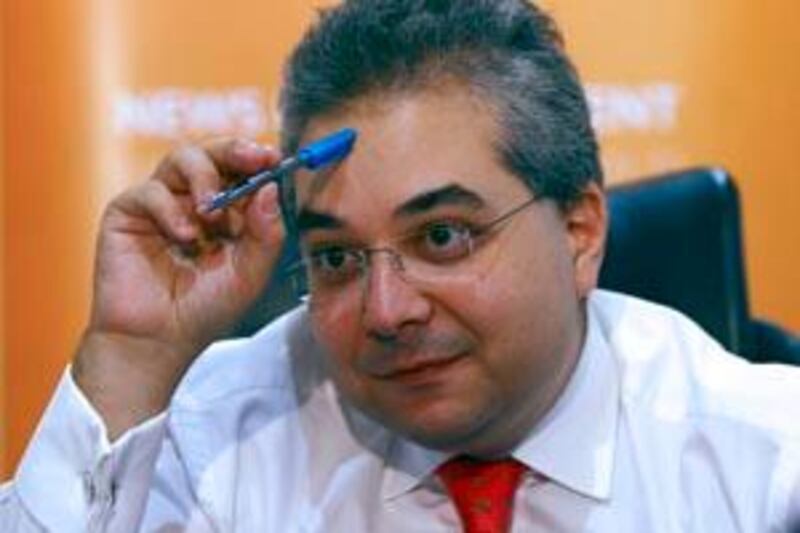The public clamour against banks and bankers is growing to a cacophony. In the West, the poor creatures are so vilified in the media that, at smart dinner parties in New York or London, bankers pretend to be estate agents, or lawyers, or even (sharp intake of breath) journalists, to escape the opprobrium that goes with their profession. Bankers used to be just boring. Now they are the butts of abuse from Boston to Belgrade.
We do things differently in the Middle East. Here, banks in the western sense (institutions that charge you to allow them to use your money) are a relatively new idea. They are distinct from, but related to, merchant finance, which has existed as long as the region has been a commercial centre. And they were modelled on western templates, often taken over by post-colonial governments. Either bestowed with traditional respect or protected by state affiliation, they could not possibly be subjected to the sometimes personally abusive tirades that pour from the western media.
Not by name, anyway. Outright criticism of Arab banks and bankers has to be generic, or coded in euphemistic terminology. It is in this light that I take the implicit criticism in a recent piece of research by Banque Saudi Fransi (BSF). The Saudi bank is an affiliate of the French giant Calyon, and so is heavily involved in the region via corporate lending. But its western lineage also entitles it to a measure of objectivity in its analysis.
Under a team led by John Sfakaniakis, a well-known commentator on Middle East financial affairs, BSF has produced its first index of business confidence for Saudi Arabia, based on a survey of 824 of the country's business leaders, predominantly chairmen and chief executives. As far as I can tell, it is the first such business opinion poll in the kingdom. The results are mainly positive: the confidence index recovered from 98.2 to 99.4 over the past three months (base 100 in mid-2009). Nearly 90 per cent of respondents expected the Saudi economy to improve over the next two quarters. None thought it would deteriorate. Two thirds said their companies' financial situation would improve over the same period.
The reason for their confidence is not hard to see. Oil prices, the dynamo of government revenue and therefore overall economic health, have risen steadily over the past year. Most business leaders thought they would rise above US$85 per barrel over the next six months. They also believed Saudi consumer demand would pick up, though gradually, and they were cautious both on increasing prices and inventories. But it seems there is an end to the period of production cuts and worker lay-offs produced by the first shock waves of global economic downturn.
Saudi business sentiment is especially strong in the property market, where the overwhelming majority believed prices had bottomed out, and most believed they would rise in the next six months. So, with GDP growth forecast to be about 3.75 per cent, and a bit of inflation (4.3 per cent) to help prime the economy, the overall prospects for Saudi Arabia look good this year. The only black mark - and it is a serious one - is the continuing paralysis of the banking sector. BSF puts it guardedly, yet clearly: "A pick up in the pace of bank credit is a pre-condition to an economic revival, particularly for the private sector. - The overwhelming sentiment of business is that banks have not been able to deliver so far." Nearly 60 per cent of business leaders said the lending attitude of banks fell "below their expectations".
That is not quite the same as calling bankers overpaid leeches who pay themselves millions and then beg for a government bailout, as has been said of western bankers. But in Saudi terms it counts as strongly worded criticism. "While they have been awash with liquidity for some time now, lenders in the kingdom are cautious about taking risks with their money," the BSF says. "Encouraging banks to boost their credit portfolios remains one of the biggest hurdles standing before a full recovery in the Saudi economy."
What the BSF report does not mention, but which has to be highlighted in any analysis of the banks' reluctance to help fund the recovery, is the pain the banks suffered as a result of the Saad-Al Gosaibi affair. These two entities owe something like US$5 billion (Dh18.36bn) to banks in the kingdom, an amount that is unlikely to be repaid in full and for which full provisions have not yet been made. With a "hit" like that outstanding, maybe the banks can be excused a little caution.
So there is a direct causal relationship between the Saad-Al Gosaibi liabilities, the banks' continuing reluctance to lend, and the Saudi economic recovery. It makes the Saudi government's inaction over the affair all the more shocking. @Email:fkane@thenational.ae





